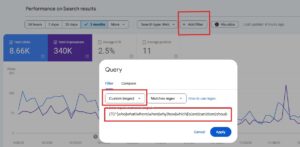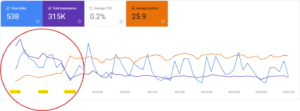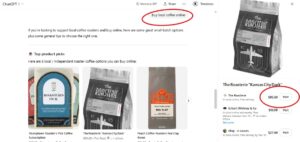In today’s digital age, building inbound links is a crucial component of search engine optimization (SEO). Inbound links, also known as backlinks, are links from other websites that point to your site. In doing so, they signal to search engines like Google that other websites consider your content valuable and relevant. This, in turn, can improve your search engine rankings and drive more traffic to your website over time.
In this guide, we will cover the following topics:
- The Importance of Inbound Links for SEO
- Types of Inbound Links
- How to Acquire Inbound Links
- Best Practices for Building Inbound Links
- Tools for Tracking and Analyzing Inbound Links
The Importance of Inbound Links for SEO
Inbound links are a key factor that search engines use to determine the relevance and authority of a website. The more inbound links a website has, the more likely it is to rank well in search engine results pages (SERPs). Inbound links can also drive referral traffic to your website, which can lead to increased brand awareness and conversions.
However, it’s important to note that not all inbound links are created equal. Search engines like Google give more weight to inbound links from reputable and authoritative websites. This is known as link equity. Therefore, it’s essential to focus on acquiring inbound links from high-quality websites.
Furthermore, Google leverages backlinks to assess the basic reputation of pages and sites. Even today, we find sites with the most domain authority ranking at the top of Google SERPS. While many have speculated over the years that Google will try to lessen the importance of links, it does remain an important factor. In fact, for many SMBs and new domains, this is the #1 reason your content is not ranking. For more on this, you can hear from Google in this video:
Types of Inbound Links
There are several types of inbound links that you can acquire for your website. Some examples include:
- Editorial Links: These are links that are acquired naturally through the creation of valuable and relevant content. Editorial links are typically considered the most valuable type of inbound link as they signal to search engines that other websites consider your content authoritative and relevant.
- Directories: These are links that are acquired by submitting your website to online directories. Directories can be a good source of inbound links, but they can also be low-quality if they are not reputable or well-maintained.
- Social Media: Social media platforms can be a great way to drive inbound links to your website. By sharing your content on social media and encouraging others to share it as well, you can acquire inbound links from social media profiles and pages.
- Forum and Blog Comments: Participating in forums and leaving comments on blogs can also be a great way to acquire inbound links. By providing valuable insights and engaging in discussions, you can build relationships with other bloggers and forum members and acquire inbound links from their websites.
How to Acquire Inbound Links
Acquiring inbound links can be a challenging task, but there are several link building strategies you can use to acquire high-quality inbound links. Some examples include:
- Creating Valuable and Relevant Content: The most effective way to acquire inbound links is by creating valuable and relevant content that other websites will want to link to. This can be in the form of blog posts, infographics, videos, and more.
- Reaching Out to Other Websites: You can also reach out to other websites and ask them to link to your content. This can be done by sending an email, leaving a comment, or using a link building tool.
- Using Social Media: Social media can be a great way to drive inbound links to your website. By sharing your content on social media and encouraging others to share it as well, you can acquire inbound links from social media profiles and pages.
- Participating in Forums and Blog Commenting: Participating in forums and leaving comments on blogs can also be a great way to acquire inbound links. By providing valuable insights and engaging in discussions, you can build relationships with other bloggers and forum members and acquire inbound links from their websites.
- Participation in News Publications, Lists, and Helping Reporters: Sites like HARO.com and Qwoted.com ask for expert opinions multiple times a day. By subscribing to their email and setting up keyword alerts for your industry, you can respond to reporters who need someone like you for a quote and potentially be featured in their article or publication.
- Guest Blogging: Another effective strategy for acquiring inbound links is guest blogging. By writing content for other websites in your industry, you can acquire inbound links from those websites and reach a new audience.
- Broken Link Building: Broken link building is a technique that involves finding broken links on other websites and offering them a replacement link to your own content. This can be a great way to acquire inbound links and help other websites improve their user experience.
- Influencer Marketing: Influencer marketing is a technique that involves working with influential people in your industry to promote your content and acquire inbound links. This can include working with bloggers, social media influencers, and other industry leaders.
Best Practices for Building Inbound Links
When building inbound links, it’s important to follow best practices to ensure that you acquire high-quality links. Some best practices include:
- Focus on Quality Over Quantity: It’s better to have fewer high-quality inbound links rather than an abundance of links that are low-quality.
- Acquire Links from Reputable and Authoritative Websites: As mentioned earlier, inbound links from reputable and authoritative websites carry more weight than those from low-quality websites.
- Use Anchor Text that is Relevant and Descriptive: Anchor text is the words in a piece of content that are hyperlinked. For search engines to understand the context of the link, it’s important to use anchor text that is both relevant and descriptive. Specific keywords you are attempting to target in your content are perfect opportunities to use as anchor text, as long as they are relevant to the landing page that is being linked to.
- Disavow Low-Quality Links: If you acquire low-quality links, it’s important to disavow them to prevent them from hurting your search engine rankings. To do so, you must request that Google ignores these low-quality links leading to your domain so they can’t be used against you and your rankings.
Tools for Tracking and Analyzing Inbound Links
Besides the best practices stated above, there are also several tools available that can help you track and analyze your inbound links. These tools can help you identify which inbound links are valuable and which are not. Some examples include:
- Google Search Console: Google Search Console is a free tool that allows you to see the inbound links that point to your website. It also provides information on how your website is performing in search engine results pages (SERPs).
- Ahrefs: Ahrefs is a tool that provides detailed information on your inbound links, including the anchor text, the linking page, and the linking domain. It also provides information on your competitors’ inbound links.
- Majestic: Majestic can provide information on your inbound links, including the trust and citation flow of the linking website. It also provides information on your competitors’ inbound links.
- Moz Link Explorer: Similar to Ahrefs, this tool gives you information about your site’s inbound links, along with providing the linking page, domain, and anchor text. Information on your competitors’ inbound links can also be viewed here.
In conclusion, building inbound links is a crucial component of SEO. By creating valuable and relevant content, reaching out to other websites, staying connected with others through social media and forums, guest blogging, and more, you can acquire high-quality inbound links that can help improve your search engine rankings. Still, link building can be a




